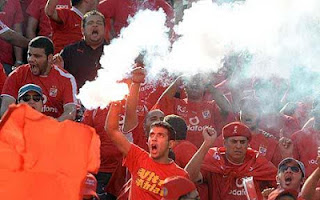The
upcoming all-North African Champions League final once again shows the Desert Foxes are kings of Africa .
 |
| Fiery passion... Al Ahly fans |
Sadly,
however, there will be little interest in South Africa
This is no
doubt a stain on South
Africa
More
significantly, though, it’s this lack of interest that has contributed to the
national team not only plummeting in the world rankings, but losing respect as
a top tier opponent on the African continent.
The record of
South African clubs in the African Champions League is dismal to say the least.
This year Orlando Pirates were timidly knocked out in the preliminary round by Angola
In 2010, the
last time the country had two teams in the competition, Pirates were again
dismissed in the preliminary round, by Gaborone United, while SuperSport fell
to a second round exit at the hands of Nigeria
The effects of
this lethargy transmute to Bafana Bafana which has dropped to a ranking of 76th
in the world.
When
Pirates famously won African Champions League in 1995 it was seen as a sign of
great things to come. After years of exile, Africa
was the new exciting frontier to be conquered. In 1993 Jomo Cosmos had
thrillingly reached the semi-finals of the Caf Cup Winner’s Cup before their
magical run was finally halted by Ivory Coast
Then in 2001
Mamelodi Sundowns reached the Champions League final while Kaizer Chiefs won
the Nelson Mandela Cup (Cup Winner’s Cup), allowing the country to enter two
clubs in the Champions League first time since re-admission.
The upshot of
this enthusiasm was a golden age for Bafana Bafana, the pinnacle of which saw
Neil Tovey lift the Africa Cup of Nations (Afcon) in 1996. Over the next five
years Bafana finished second and third at the Afcon and qualified for two
consecutive World Cup finals, 1998 and 2002.
 |
| Bafana Bafana's crowning glory... Captain Neil Tovey lifts the 1996 Africa Cup of Nations |
The current
list consists of Tunisia , Egypt , Nigeria ,
Sudan , the DRC, Algeria , Morocco ,
Mali , Cameroon , Ivory
Coast , Angola
and Zimbabwe
The
African Champions League has its problems no doubt. Perhaps it would help if
the lucrative group stages happened earlier with four groups instead of the
current two. Conceivably this would decrease travelling distances and generate
more interest in the competition with more countries involved.
South African
teams also point to the high costs of participating in African competitions and
in 2005 Kaizer Chiefs pulled of Confederation Cup match citing this very reason
resulting in a three-year ban from Caf.
Even so, the
country seems to be missing the bigger picture. National team achievement and
club success are not mutually exclusive.
Another
African example is TP Mazembe’s recent rise which has seen the rebirth of their
national side resulting in the DRC qualifying for the Afcon for the first time
since 2004.
Going further
back, the platform for the success enjoyed by Cameroon
Deprived of
the hardened nature of African competition South Africa
Gloomy stats
are readily available.
The last time
Bafana won a game at the Afcon was on January 24 2004, a 2-0 win over Benin , while South Africa
“It is
important to take part in African club competitions,” former Bafana coach Pitso
Mosimane said last year. “Our players need to experience the harsh conditions,
learn about the lack of facilities in other parts of the continent to realise
how fortunate they are; they need to rough it and travel in the kind of bus
that looks like it could disintegrate any time.”
“They need to
experience hostile crowds in a packed stadium,” Mosimane said. It will build
their character. It will make them stronger mentally and, by the time they get
selected for national duty, they will have experienced it all while playing for
their club sides. It can only help our junior and senior national teams in
Africa Cup of Nations and World Cup qualifiers.”
It’s difficult
to disagree.
 |
| The Old Guard Bafana's battle-hardened soldiers |
Plans
are afoot to try and remedy the situation.
In April PSL
chief executive Stanley Matthews revealed plans to align South Africa’s
football season with the calendar from 2014, as is the norm in most African
countries and to the way the Champions League is played, in a bid to help South
African clubs become more competitive on the continent.
“In principle
the executive have agreed to switch the season to a calendar year to be in line
with the rest of Africa ,” Matthews said. “The
league wants to see its clubs do well in Africa
and this is a step in that direction.”
1995, the year
when Pirates lifted the Champions League trophy, was the last in which the
domestic league was played in the January-December format, before shifting to
the European (August to May) calendar in 1996.
Whether a
switch back is a definitive solution is debatable. Calendar change or not, what
seems of most importance is clubs take the Caf Champions League much more
seriously.
With the 2013
Afcon just around the corner South
Africa South Africa
has arguably the top domestic league in Africa .
But for the country to be taken seriously as a football nation it has to do
much better in Pan African competitions, coupled with the realisation that South Africa

The tab hanging off the edge of the table with the rest of the four parts of it to try to come across as the table (pictured) triangular "football" get. After scoring a team created by fingers "rules" of the opponent, as it rises on the ball with a flick of a project becomes an "extra points" you can try.
ReplyDelete